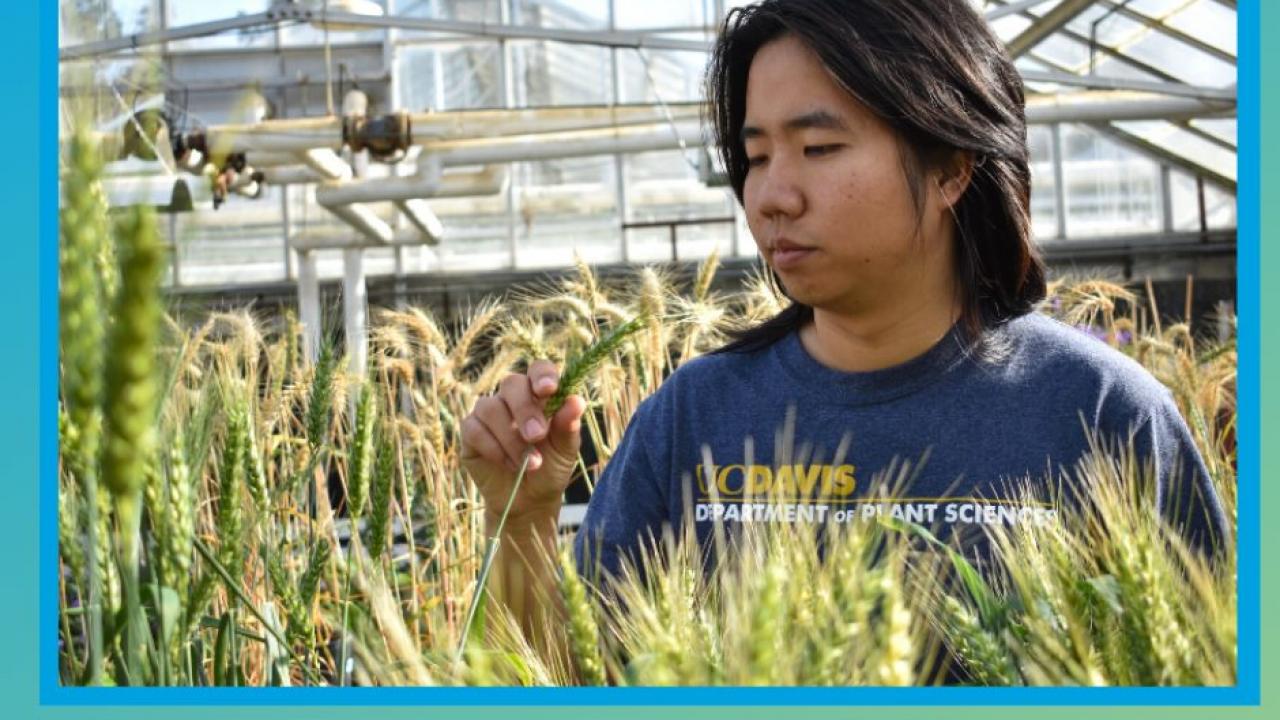
Meet Public Scholarship and Engagement Prize Winner Paul Kasemsap
Grad Slam Finalist Awarded for Public Impact Research
UC Grad Slam is an annual contest in which master’s and Ph.D. students present the significance and fundamental points of their work at UC Davis in a clear, direct, and interesting manner that appeals to general audiences. This year, Public Scholarship and Engagement offered an award for the finalist whose research was conducted in collaboration with non-university partners or demonstrated the highest potential for public impact.
The inaugural awardee is Paul Kasemsap, a Ph.D candidate in horticulture and agronomy studying plant physiology (i.e. how plants turn sunlight, air, water, and dirt into food). His Grad Slam presentation — “Mission N Possible: Let There Be (Nutritious) Bread” — explores how we can make staple crop wheat resilient to changes in the climate system. Rising carbon dioxide (CO2) levels prevent plants from turning soil nitrogen into protein, essentially threatening our global food and nutritional security. He's hoping his research will answer fundamental questions on how plants make food and help sustain nutritional qualities of our major food sources in response to climate conditions anticipated in the near future.
We asked him about his current research and future plans — read his interview below.
How would you characterize the public impact (or potential public impact) of your research?
My Mission N Possible is well-aligned with Goal 2 (Zero Hunger) and Goal 13 (Climate Action) of the United Nations Sustainable Development Goals. The research addresses and provides solutions to sustain nutritional qualities of our food crops to meet the challenge of climate change. Wheat is a staple crop that provides a substantial amount of protein and calories in human daily diets. As the level of atmospheric carbon dioxide (C02) rises, grain protein concentration goes down, making our food crops less nutritious. My research answers fundamental questions on how plants turn their resources, specifically nitrogen and CO2, into nutritious grains, and helps inform farmers how we can sustainably grow our food in climate conditions anticipated in the near future. To ensure the future of our food, everyone in the global community needs to work together to reduce greenhouse gas emission, especially CO2. Our work ensures we all have tasty, nutritious food to enjoy along the way!
Is it important to you to see a connection between your research and how it can positively impact society?
I was first drawn into research by my love of plants. Yet, I've become a food enthusiast and stayed committed to doing research in Plant Sciences because of the potential impacts it has on the well-being of our global community. Everyone eats and enjoys food every day. Access to "sufficient, safe and nutritious food*" is fundamental to our quality of life. Human-driven climate change threatens the future of our global food and nutrition security. I hope to continue working on research that combines my major areas of interests together: Plant and Food production, Climate Change Mitigation Strategies and Science Education.
*Concept of Food Security defined by FAO (FAO Committee on World Food Security, Reform of the Committee on World Food Security: Final version 2019: Rome.)
Have you already or do you plan to work with individuals or organizations outside of academia (like non-profits, government agencies, community groups) to tackle issues around food security?
I aspire to pursue a career as a researcher within international collaborative environments, contributing to fulfilling the missing gaps of the “Feeding the world” grand challenge. My current doctoral research was primarily supported by the United States Department of Agriculture, NIFA-IWYP (National Institute of Food and Agriculture - International Wheat Yield Partnership). Outside the lab, I have been a regular volunteer at local community gardens and a food bank. I recently helped launch the "Precision Protein" Challenge with FoodShot Global, a collaborative investment platform that empowers innovative companies and ideas on transforming the food system, as part of the Grad Innovator Fellowship from UC Davis Innovation Institute for Food and Health. I am also part of the local student club, Davis Alt. Protein Project. Currently, we are working on launching a new student-led course on alternative protein sources.
